高考语法复习 情态动词 新课标 人教版
高考英语一轮复习 语法专项提升专题八 情态动词和虚拟语气课件 新人教版(共64张PPT)

“Jmacuksts/mhoauyl/dmbigehht/ecraena’tt/ctohueldmnHo’tm+abeedntd.yoinogu” 对ta正k在e进n行m的y动作ad的v推i测ce。, you wouldn’t have failed in
the examination. 如果你听了我的建议,你就不会考试不及格了。
这场事故本来是可以避免的。
表示对过去行为的推测,意为“可能做过”。might 所表示的可能性比 较弱,语气较委婉。此外might have done 可表示“本可能做而实际上未 做”。
—I can’t find my purse anywhere. ——我到处都找不到我的钱包。
—You may have lost it while shopping. ——你可能在购物的时候弄丢了。
week!
Should
I
be
free
tomorrow,
I
would
come.
——他一定是做了足够的准备。
【解析】句意:——我想知如道果我是我否可明以天用这有张回空程机,票我登机会。 来。
There is a possibility that these hens could be frightened and lay fewer eggs would there be a sudden loud noise.
情态动词的基本用法
(1) 用在第一、三人称的疑问句中,表示征求对方的意见或指 示。
—Has arrived? ——王先生到了吗?
—Yes, already. Shall he wait outside or just come in?
——是的,已经到了。是让他进来,还是在外面等?
高考英语一轮复习语法专题情态动词与虚拟语气新人教版必修5
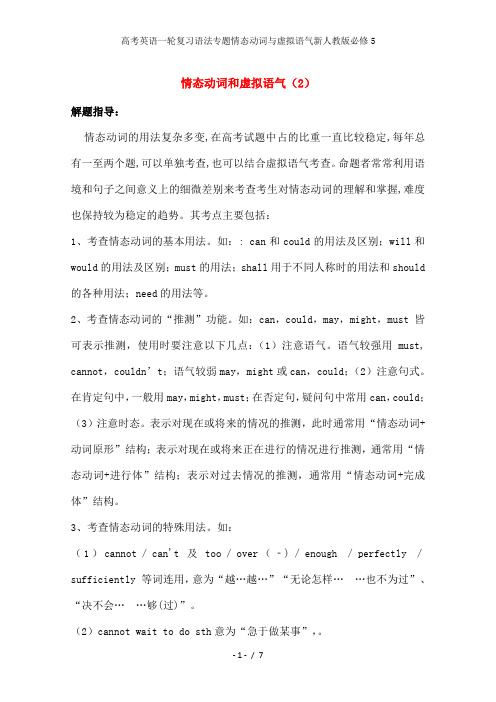
情态动词和虚拟语气(2)解题指导:情态动词的用法复杂多变,在高考试题中占的比重一直比较稳定,每年总有一至两个题,可以单独考查,也可以结合虚拟语气考查。
命题者常常利用语境和句子之间意义上的细微差别来考查考生对情态动词的理解和掌握,难度也保持较为稳定的趋势。
其考点主要包括:1、考查情态动词的基本用法。
如:: can和could的用法及区别;will和would的用法及区别;must的用法;shall用于不同人称时的用法和should 的各种用法;need的用法等。
2、考查情态动词的“推测”功能。
如:can,could,may,might,must 皆可表示推测,使用时要注意以下几点:(1)注意语气。
语气较强用must, cannot,couldn’t;语气较弱may,might或can,could;(2)注意句式。
在肯定句中,一般用may,might,must;在否定句,疑问句中常用can,could;(3)注意时态。
表示对现在或将来的情况的推测,此时通常用“情态动词+ 动词原形”结构;表示对现在或将来正在进行的情况进行推测,通常用“情态动词+进行体”结构;表示对过去情况的推测,通常用“情态动词+完成体”结构。
3、考查情态动词的特殊用法。
如:(1)cannot/can't 及too/over(‐)/enough /perfectly /sufficiently 等词连用,意为“越…越…”“无论怎样……也不为过”、“决不会……够(过)”。
(2)cannot wait to do sth意为“急于做某事”,。
(3)would 和used to的区别;can 和be able to的区别。
(4)“may / might well+动词原形”意为“理应,有足够的理由”;“may/ might as well+动词原形”意为“还不如,不妨,还是…的好”。
(5)must表示偏执型,意为“偏要”;“硬要”;can用在肯定句,可以表示客观上的“可能性”;shall用在法律、条约、协定等文件中可以表示义务、规定等;should表示估计或推测上的“应该”,译为“可能,该,估计,按理应当”;will 可以表示习惯和倾向性,意为“惯于, 老是, 终归是”等。
高考语法复习 情态动词 新课标 人教版

情态动词常见的情态动词有:can 能may 可以will,would (表意愿)need 需要dare 敢must 必须have to 不得不shall,should 应该(表义务)ought to 应该1.can,could 的用法1.1表能力,有“能”、“会”、“能够”的意思例如:Can you drive a car? 你会开车吗?-----Yes, I can. 我会。
-----No, I can't. 我不会。
1.2表允许,在口语中代替 may,有“可以”的意思例如:Can I use your bike?我可以用你的自行车吗?1.3表示可能性,常用于否定句和疑问句例如:Can it be true?那会是真的吗?Today is Sunday. He can't be at school.今天是星期天。
他不可能在学校里。
1.4过去式could表示的语气更加委婉、客气例如:Could I come to see you tomorrow?明天我可以来见你吗?1.5 can 和 be able to 的比较1) can 只有一般现在时和一般过去时两种时态(could),其他时态要用be able to的形式例如:I haven't been able to get in touch with her.我一直没能和她联系上。
2) 通常can 和 be able to 可以互换例如:He will come if he can.如果可能的话,他一定会来。
2.may,might的用法2.1表示许可或征求对方的许可,有“可以”的意思。
例如:You may go now.你可以走了。
May I use your computer?我用一下你的电脑可以吗?2.2回答以may开头的疑问句有如下表达法:例如:May I smoke here? 我可以在这儿抽烟吗?-----Yes, you may.-----Yes, please.------No, you can't.------No, you mustn't.------No, you'd better not.2.3表示猜测,通常只用于陈述句例如:You may be right.你可能是对的。
【人教课标版】高考英语一轮复习精品语法(课件)专题8正反解读情态动词和虚拟语气
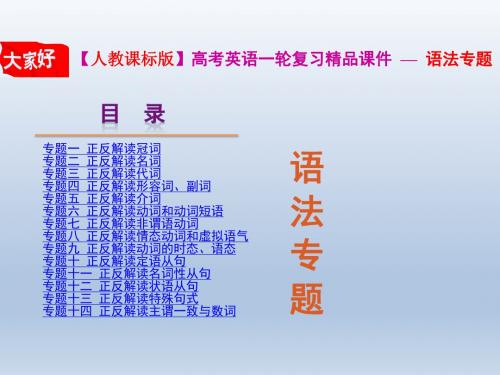
modal verbs
must ought to
need
dare
Used to
专题八 │ 考点荟萃
自主学习
情态动词的语法特征
• 1情态动词除ought to和used to外,后 面只能接不带to的不定式。
• 2情态动词没有人称,数的变化,will can dare 除外。
• 3情态动词“时态”的形式并不是区分 时间的主要标准。
baby?
专题八 │ 正面解读
• 2.must, should
情态 动词 must
意义 必须
例句
①We must help each other to overcome the difficulties. ②— Must I finish the work today?— No, you needn't/you don't have to./Yes, you must. ③You mustn't take photos here, and it is forbidden.
注意事项
①need可以作实义动词,用于 各种句式。如:I need to go at once. I don't need to go at once. —Do you need to go at once?—Yes,I do. ②need作情态动词常用于否定、 疑问或条件句中。 dare和need一样,既可以作情 态动词,也可用作实义动词。用 作情态动词时,主要用于否定句、 疑问句和条件句。用作实义动词 时,可用于各种句式。如:He didn't dare (to) go out alone at night. (在否定句中to有时可省略)
专题八 │ 正面解读
2020版高考英语(新课改·人教版)一轮复习学案专题七情态动词与虚拟语气含解析
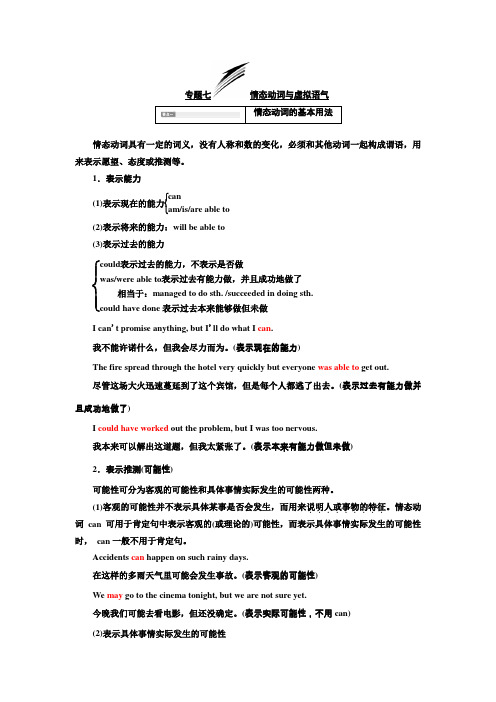
专题七情态动词与虚拟语气情态动词具有一定的词义,没有人称和数的变化,必须和其他动词一起构成谓语,用来表示愿望、态度或推测等。
1.表示能力(1)表示现在的能力⎩⎨⎧canam/is/are able to(2)表示将来的能力:will be able to (3)表示过去的能力⎩⎪⎨⎪⎧could 表示过去的能力,不表示是否做was/were able to 表示过去有能力做,并且成功地做了 相当于:managed to do sth. /succeeded in doing sth.could have done 表示过去本来能够做但未做I can 't promise anything, but I 'll do what I can . 我不能许诺什么,但我会尽力而为。
(表示现在的能力)The fire spread through the hotel very quickly but everyone was able to get out. 尽管这场大火迅速蔓延到了这个宾馆,但是每个人都逃了出去。
(表示过去有能力做并且成功地做了)I could have worked out the problem, but I was too nervous.我本来可以解出这道题,但我太紧张了。
(表示本来有能力做但未做) 2.表示推测(可能性)可能性可分为客观的可能性和具体事情实际发生的可能性两种。
(1)客观的可能性并不表示具体某事是否会发生,而用来说明人或事物的特征.........。
情态动词can 可用于肯定句中表示客观的(或理论的)可能性,而表示具体事情实际发生的可能性时, can 一般不用于肯定句。
Accidents can happen on such rainy days.在这样的多雨天气里可能会发生事故。
(表示客观的可能性) We may go to the cinema tonight, but we are not sure yet. 今晚我们可能去看电影,但还没确定。
高中英语 H__情态动词课件 新人教版必修4

3) must+ v
He must be at the library.
can’t+ v
第十页,共86页。
4) Must用语肯定句中表示“偏偏”。 Naturally, after I told her what to do, my daughter
must go and do the opposite. 自然地,在我交代女儿做什么之后,她偏偏要做相反
Whenever we were in the country, we
_____w_o_u_l_d____play hide-and-seek in the fields.
2.表示过去的状态,只能用 used to,不可用would。例 如:
There ____________ be a park.
of our hotel that payment ____ be made in
cash.
A、shall B、need
A C、will D、can
第二十页,共86页。
8. shall / should/ ought to
shall
1)What shall we do now?
Shall she come right now?
第十二页,共86页。
B She is a bit shy and _____ stand up and
answer the teacher's questions.
A.dares not
B.doesn't dare to
C.dare not to
D.dares not to
I wonder how he _A__ to his father like
2022高考英语统考一轮复习第七章情态动词参考课件新人教版

用适当的情态动词填空。 1. He was a good swimmer, so he _c_o_u_l_d_/w__a_s_a_b_l_e_t_o swim to the riverbank when the boat sank. 2. John _m__a_y____ come to see us tonight, but he isn't very sure yet. 3. Even the top students in our class can't work out this problem, so it _m__u_st____ be very difficult. 4. The children m__u_s_t_n_'t__ play football on the road. 5. The painting m__a_y_/_m_i_g_h_t not be a masterpiece, but the colors are marvelous.
但dare 还可以作及物动词, 跟不定式, 有人称和数的变化, 并受时态 的影响。 We must dare to act. 我们要敢干。 I wonder how he dared to say such a thing. 我奇怪他怎么敢说这样的话。
(5)shall作为情态动词,用在第一、三人称作主语的疑问句中, 表示 “征求对方的建议”; 用在第二、三人称作主语的陈述句中, 表示说 话者的“命令、警告、威胁、许诺”等语气。如: A group of students are waiting to see you outside. Shall they come in? 一群学生在外面等着见你。他们可以进来吗? Don't worry. You shall have the tickets for the games. 不用担心,你们会有比赛的票。
高中英语 情态动词语法复习课件 新人教版
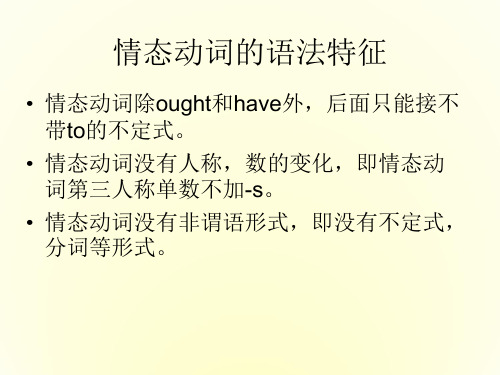
“The interest ______be divided into five parts, according to the agreement made by both sides. A. may B. should C. must D. shall — The room is so dirty. _____ we clean it? — Of course. (2003北京春) A. Will B. Shall C. Would D. Do 上述两题均考查 shall的非常用含义,当shall 用于一、三人称疑问句中时,表示征求对方意 见;用于二、三人称陈述句中,表示说话人给 对方的命令、警告、允诺或威胁等。
You could at least have sent five cards.你本来可以至少寄 去5张明信片的。(说明没有 寄那么多)
表猜测语气的反意疑问句的构成
He must be reading, ____ he? isn’t You must do it yourself, don ____ ’you? t He must have gone over the article, ______he? hasn’ It must have rained last night, _____ didn it?
表示推测的用法 can, could, may, might, must 皆可表 示推测
• 情态动词+动词原形 表示对现在或将来的情况推测
不同的“肯定”程度可按下列层次排列: He is at home. (事实) He must be at home.(非常肯定的推断) He could be at home.(很可能) He ought to be at home.(很可能) He may be at home.(仅仅可能而已) He might be at home.(或许, 非常不确定) He might not be at home.(也许不在家) He may not be at home. (比might可能) He couldn’t be at home.(很可能不在家) He can’t be at home.(一定不在家) He isn't at home.(事实)
英语必修Ⅲ人教新课标同步知识点学练考--情态动词
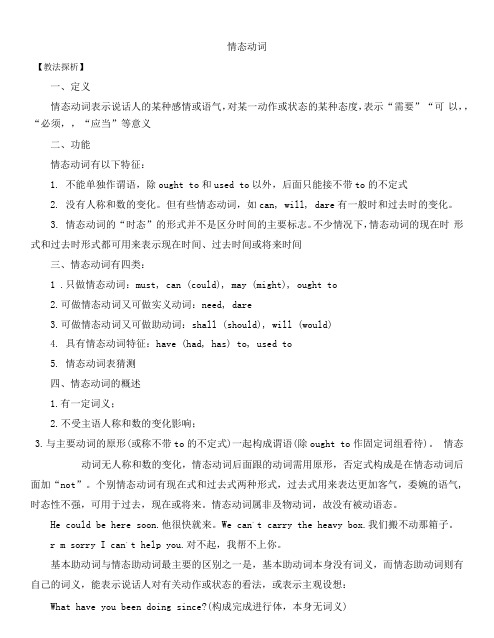
情态动词【教法探析】一、定义情态动词表示说话人的某种感情或语气,对某一动作或状态的某种态度,表示“需要”“可以,,“必须,,“应当”等意义二、功能情态动词有以下特征:1.不能单独作谓语,除ought to和used to以外,后面只能接不带to的不定式2.没有人称和数的变化。
但有些情态动词,如can, will, dare有一般时和过去时的变化。
3.情态动词的“时态”的形式并不是区分时间的主要标志。
不少情况下,情态动词的现在时形式和过去时形式都可用来表示现在时间、过去时间或将来时间三、情态动词有四类:1 .只做情态动词:must, can (could), may (might), ought to2.可做情态动词又可做实义动词:need, dare3.可做情态动词又可做助动词:shall (should), will (would)4.具有情态动词特征:have (had, has) to, used to5.情态动词表猜测四、情态动词的概述1.有一定词义;2.不受主语人称和数的变化影响;3.与主要动词的原形(或称不带to的不定式)一起构成谓语(除ought to作固定词组看待)。
情态动词无人称和数的变化,情态动词后面跟的动词需用原形,否定式构成是在情态动词后面加“not”。
个别情态动词有现在式和过去式两种形式,过去式用来表达更加客气,委婉的语气, 时态性不强,可用于过去,现在或将来。
情态动词属非及物动词,故没有被动语态。
He could be here soon.他很快就来。
We can,t carry the heavy box.我们搬不动那箱子。
r m sorry I can,t help you.对不起,我帮不上你。
基本助动词与情态助动词最主要的区别之一是,基本助动词本身没有词义,而情态助动词则有自己的词义,能表示说话人对有关动作或状态的看法,或表示主观设想:What have you been doing since?(构成完成进行体,本身无词义)I am afraid I must be going. (一定要)You may have read some account of the matter. (或许己经)除此之外,情态助动词还有如下词法和句法特征:(1)除ought和used以外,其他情态动词后面只能接不带to的不定式。
人教版高考(完整版)情态动词大全
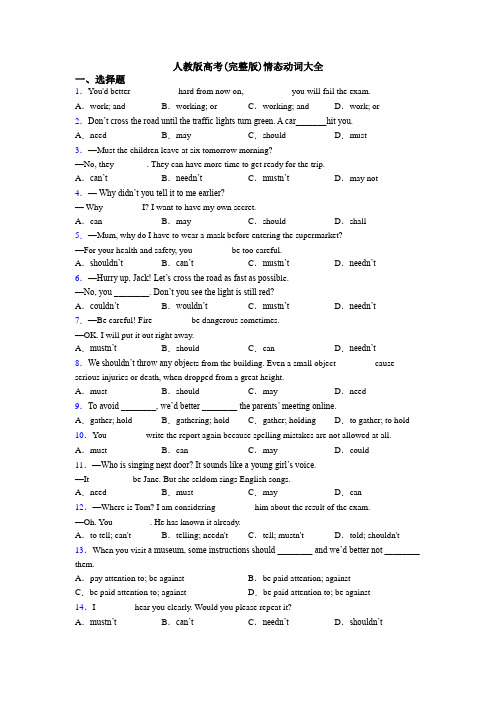
人教版高考(完整版)情态动词大全一、选择题1.You'd better __________ hard from now on, __________ you will fail the exam.A.work; and B.working; or C.working; and D.work; or 2.Don’t cross the road until the traffic lights turn green. A car_______hit you.A.need B.may C.should D.must3.—Must the children leave at six tomorrow morning?—No, they _______. They can have more time to get ready for the trip.A.can’t B.needn’t C.mustn’t D.may not 4.—Why didn’t you tell it to me earlier?— Why ________ I? I want to have my own secret.A.can B.may C.should D.shall 5.—Mum, why do I have to wear a mask before entering the supermarket?—For your health and safety, you ________ be too careful.A.shouldn’t B.can’t C.mustn’t D.needn’t 6.—Hurry up, Jack! Let’s cross the road as fast as possib le.—No, you ________. Don’t you see the light is still red?A.couldn’t B.wouldn’t C.mustn’t D.needn’t7.—Be careful! Fire ________ be dangerous sometimes.—OK. I will put it out right away.A.mustn’t B.should C.can D.needn’t8.We shouldn’t throw any obje cts from the building. Even a small object ________ cause serious injuries or death, when dropped from a great height.A.must B.should C.may D.need9.To avoid ________, we’d better ________ the parents’ meeting online.A.gather; hold B.gathering; hold C.gather; holding D.to gather; to hold 10.You ________ write the report again because spelling mistakes are not allowed at all. A.must B.can C.may D.could 11.—Who is singing next door? It sounds like a young girl’s voice.—It _________ be Jane. But she seldom sings English songs.A.need B.must C.may D.can 12.—Where is Tom? I am considering ________ him about the result of the exam.—Oh. You ________. He has known it already.A.to tell; can't B.telling; needn't C.tell; mustn't D.told; shouldn't 13.When you visit a museum, some instructions should ________ and we’d better not ________ them.A.pay attention to; be against B.be paid attention; againstC.be paid attention to; against D.be paid attention to; be against14.I ________ hear you clearly. Would you please repeat it?A.mustn’t B.can’t C.needn’t D.shouldn’t15.A lot of online resources ________ be used either by teachers at school or parents at home. A.can B.should C.need D.must 16.—Amy, I hear you've got many foreign coins._______ I have a look?—Of course, I'll fetch them for you.A.May B.MustC.Should D.Need17.You ______ pay too much attention to your pronunciation, as it is so important in the oral (口头的) test.A.shouldn’t B.mustn’t C.can’t D.needn’t 18.—Shall we go camping this summer holiday?—Nothing________be better.A.should B.could C.must D.may19.—Will your mother be at home this Saturday?—Hard to say. She _______go to the countryside to see my grandparents.A.must B.may C.can D.would20.— Is Lang Lang going to perform at Art Center this Friday?— Yes. It ________ be him. He has been here for three days.A.might B.must C.mustn’t D.may21.Mr. Black ________ be at home now. He went abroad on vacation last Friday.A.can’t B.mustn’t C.needn’t D.shouldn’t 22.According to the rule, used batteries ________ be dropped in the red bin for harmful wastes. A.may B.would C.should D.might23.Never throw objects from the building. Even a small object ________ cause serious injuries, or death, when dropped from a great height.A.must B.should C.may D.need24.—Is it usually warm in Yancheng in May?—Yes. But it _______ be rather cold sometimes.A.must B.should C.would D.can25.You ________ pay too much attention to protecting yourself if you plan to go abroad. A.mustn’t B.can’t C.shouldn’t D.needn’t 26.When people are waiting at the zebra crossing, cars and buses ________ wait and let them go first.A.must B.may C.can D.need27.—Shall I tell him the change of the time right now?—I’m afraid you ________, otherwise he will be late for the meeting.A.can B.may C.must D.need28.—Must we stop the Japanese government discharging nuclear waste water (排放核污水) into the Pacific Ocean?—________. Because everyone should protect our earth and it is bad ________ us to eat the polluted seafood and drink the waste water.A.Yes, we can; of B.No, we mustn’t; of C.Yes, we must; for D.No, we needn’t; for 29.—How do you like my new dress?—Well, if I ________ say, it is not suitable for you.A.may B.must C.have to D.should 30.Sometimes smiles ________ be false, hiding other feelings like anger, fear or worry. A.should B.would C.must D.can31.A hard-working man ________ become a great scientist, but a great scientist ________ be a hard-working man.A.can’t; can B.may not; must C.can’t; must D.may not; can 32.—The article says that a person’s animal sign decides his personality.—You ________ read it for fun, but don’t believe in that.A.can B.must C.shouldn’t D.needn’t 33.—Mum, I bought some strawberries on my way home.—Oh, you’re so sweet. But the strawberries ________ be put into the fridge for freshness. A.must B.can C.may D.need34.—In China, many students have to stay up late to do their homework.—No worries. The government has realized the problem. I’m sure there ________ be good news soon.A.can B.should C.must D.need 35.—Who’s the man over there? Is that Mr. Black?—It ________ be him. Mr. Black is much taller than that man.A.may B.must C.can’t D.mustn’t36.You ________ drive after drinking alcohol(酒). It’s against the law.A.mustn’t B.needn’t C.couldn’t D.wouldn’t37.You ________ be careful with the camera. It costs!A.can B.will C.should D.may38.—Do we have to finish this today?—Yes, you ________ . Today is the last day.A.would B.may C.can D.must39.Sorry, smoking is not allowed here. If you ________ , you will be fined according to the rules. A.can B.will C.may D.must40.Cars ________ give way to walkers on some roads in Binhai, or the drivers will be fined. A.may B.will C.can D.must【参考答案】一、选择题1.D解析:D【详解】句意:你最好从现在开始努力学习,否则你考试会不及格的。
2021-2022年高考英语 考点聚焦+名题导解备考情态动词 新人教版
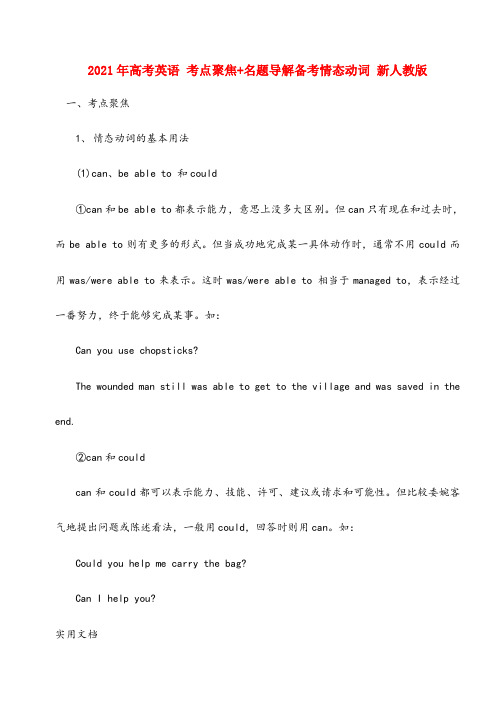
2021年高考英语考点聚焦+名题导解备考情态动词新人教版一、考点聚焦1、情态动词的基本用法(1)can、be able to 和could①can和be able to都表示能力,意思上没多大区别。
但can只有现在和过去时,而be able to则有更多的形式。
但当成功地完成某一具体动作时,通常不用could而用was/were able to来表示。
这时was/were able to 相当于managed to,表示经过一番努力,终于能够完成某事。
如:Can you use chopsticks?The wounded man still was able to get to the village and was saved in the end.②can和couldcan和could都可以表示能力、技能、许可、建议或请求和可能性。
但比较委婉客气地提出问题或陈述看法,一般用could,回答时则用can。
如:Could you help me carry the bag?Can I help you?实用文档(2)may/might①may/might表示可能,但may比might可能性大。
如:-Why isn’t he in class?He may be sick.(生病的可能性较大)—He might be sick.(生病的可能性较小)②may/might表示“允许”,may用于现在时或将来时,might常用在间接引语中表过去时,但might也可用于现在时间,表示比较委婉的语气,回答用may。
如:He says we may leave.He said we might leave.③may / might 表示建议或请求,但might比may 更客气,意思更肯定而无过去时态的含义。
Yes, you can / may.—May / Might I use your bike? —No, you mustn’t(3)must①must表示必须,应该,没有时态变化。
高考英语一轮复习语法专题情态动词和虚拟语气(讲)(含解析)新人教版必修4
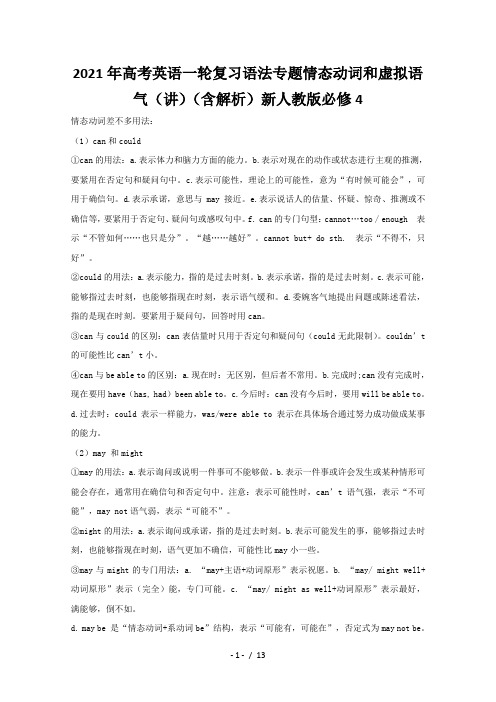
2021年高考英语一轮复习语法专题情态动词和虚拟语气(讲)(含解析)新人教版必修4情态动词差不多用法:(1)can和could①can的用法:a.表示体力和脑力方面的能力。
b.表示对现在的动作或状态进行主观的推测,要紧用在否定句和疑问句中。
c.表示可能性,理论上的可能性,意为“有时候可能会”,可用于确信句。
d.表示承诺,意思与may接近。
e.表示说话人的估量、怀疑、惊奇、推测或不确信等,要紧用于否定句、疑问句或感叹句中。
f. can的专门句型:cannot…too / enough 表示“不管如何……也只是分”。
“越……越好”。
cannot but+ do sth. 表示“不得不,只好”。
②could的用法:a.表示能力,指的是过去时刻。
b.表示承诺,指的是过去时刻。
c.表示可能,能够指过去时刻,也能够指现在时刻,表示语气缓和。
d.委婉客气地提出问题或陈述看法,指的是现在时刻。
要紧用于疑问句,回答时用can。
③can与could的区别:can表估量时只用于否定句和疑问句(could无此限制)。
couldn’t 的可能性比can’t小。
④can与be able to的区别:a.现在时:无区别,但后者不常用。
b.完成时;can没有完成时,现在要用have(has, had)been able to。
c.今后时:can没有今后时,要用will be able to。
d.过去时:could表示一样能力,was/were able to 表示在具体场合通过努力成功做成某事的能力。
(2)may 和might①may的用法:a.表示询问或说明一件事可不能够做。
b.表示一件事或许会发生或某种情形可能会存在,通常用在确信句和否定句中。
注意:表示可能性时,can’t语气强,表示“不可能”,may not语气弱,表示“可能不”。
②might的用法:a.表示询问或承诺,指的是过去时刻。
b.表示可能发生的事,能够指过去时刻,也能够指现在时刻,语气更加不确信,可能性比may小一些。
高考英语一轮复习 考点13 情态动词和虚拟语气考点归纳-人教版高三全册英语试题
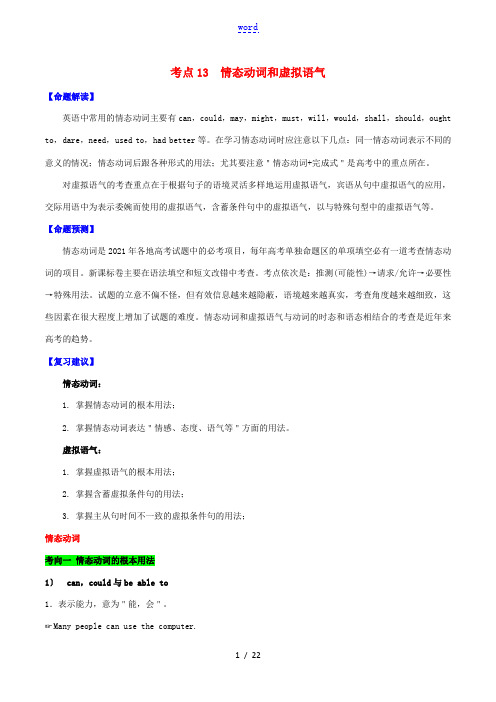
考点13 情态动词和虚拟语气【命题解读】英语中常用的情态动词主要有can,could,may,might,must,will,would,shall,should,ought to,dare,need,used to,had better等。
在学习情态动词时应注意以下几点:同一情态动词表示不同的意义的情况;情态动词后跟各种形式的用法;尤其要注意"情态动词+完成式"是高考中的重点所在。
对虚拟语气的考查重点在于根据句子的语境灵活多样地运用虚拟语气,宾语从句中虚拟语气的应用,交际用语中为表示委婉而使用的虚拟语气,含蓄条件句中的虚拟语气,以与特殊句型中的虚拟语气等。
【命题预测】情态动词是2021年各地高考试题中的必考项目,每年高考单独命题区的单项填空必有一道考查情态动词的项目。
新课标卷主要在语法填空和短文改错中考查。
考点依次是:推测(可能性)→请求/允许→必要性→特殊用法。
试题的立意不偏不怪,但有效信息越来越隐蔽,语境越来越真实,考查角度越来越细致,这些因素在很大程度上增加了试题的难度。
情态动词和虚拟语气与动词的时态和语态相结合的考查是近年来高考的趋势。
【复习建议】情态动词:1. 掌握情态动词的根本用法;2. 掌握情态动词表达"情感、态度、语气等"方面的用法。
虚拟语气:1. 掌握虚拟语气的根本用法;2. 掌握含蓄虚拟条件句的用法;3. 掌握主从句时间不一致的虚拟条件句的用法;情态动词考向一情态动词的根本用法1〕can,could与be able to1.表示能力,意为"能,会"。
☞Many people can use the computer.许多人会用电脑。
☞If you have a good sleep,you will be able to work out this problem.如果你好好睡一觉,你将能够解出这道题。
☞I could have worked out the problem,but I was too nervous.我本来可以解决这个问题,但我太紧张了。
高考英语一轮复习 语法点专题讲解 情态动词-人教版高三全册英语试题

情态动词情态动词顾名思义就是表示情感和态度的词,常见的有:can (could); may (might); must; have to; shall (should); will (would); need; dare (dared); ought to; 情态动词没有人称和数的变化,不能单独使用,它与其后的动词原形合成谓语结构。
它们的用法如下:一. can和could 的用法1.表示能力或客观的可能性,还可以表示请求和允许。
如:Can you finish this work tonight? Man cannot live without air.— Can I go now? — Yes, you can.注意:1)could表示语气较委婉的请求,主要用语疑问句,〔用于此意义时不用在肯定句〕答语用can。
— Could I come to see you tomorrow?— Yes, you can. (不能用could). 〔否认句常用No, I'm afraid not.〕2)can表示能力时,还可以用“be able to〞代替,例如:I'll be able to come this afternoon.但当我们要表示“某件事已成〞时,须用“was (were) able to〞不能用could,例如:He was able to go to the party yesterday evening and he enjoyed himself very much.2.表示“惊异、怀疑、不相信〞的态度。
〔主要用在否认句、疑问句和感叹句中〕Can this be true? How can you say like that? This cannot be done by him.3.“can (could) + have + done〞的疑问或否认形式表示对过去发生的行为怀疑或不肯定。
- 1、下载文档前请自行甄别文档内容的完整性,平台不提供额外的编辑、内容补充、找答案等附加服务。
- 2、"仅部分预览"的文档,不可在线预览部分如存在完整性等问题,可反馈申请退款(可完整预览的文档不适用该条件!)。
- 3、如文档侵犯您的权益,请联系客服反馈,我们会尽快为您处理(人工客服工作时间:9:00-18:30)。
情态动词常见的情态动词有:can 能may 可以will,would (表意愿)need 需要dare 敢must 必须have to 不得不shall,should 应该(表义务)ought to 应该1.can,could 的用法1.1表能力,有“能”、“会”、“能够”的意思例如:Can you drive a car? 你会开车吗?-----Yes, I can. 我会。
-----No, I can't. 我不会。
1.2表允许,在口语中代替 may,有“可以”的意思例如:Can I use your bike?我可以用你的自行车吗?1.3表示可能性,常用于否定句和疑问句例如:Can it be true?那会是真的吗?Today is Sunday. He can't be at school.今天是星期天。
他不可能在学校里。
1.4过去式could表示的语气更加委婉、客气例如:Could I come to see you tomorrow?明天我可以来见你吗?1.5 can 和 be able to 的比较1) can 只有一般现在时和一般过去时两种时态(could),其他时态要用be able to的形式例如:I haven't been able to get in touch with her.我一直没能和她联系上。
2) 通常can 和 be able to 可以互换例如:He will come if he can.如果可能的话,他一定会来。
2.may,might的用法2.1表示许可或征求对方的许可,有“可以”的意思。
例如:You may go now.你可以走了。
May I use your computer?我用一下你的电脑可以吗?2.2回答以may开头的疑问句有如下表达法:例如:May I smoke here? 我可以在这儿抽烟吗?-----Yes, you may.-----Yes, please.------No, you can't.------No, you mustn't.------No, you'd better not.2.3表示猜测,通常只用于陈述句例如:You may be right.你可能是对的。
2.4过去式might表示的语气更加委婉、客气例如:Might I use your pen for a while?我能用用你的钢笔吗?2.5在口语中can可以代替may表示许可,但can较随便,may更正式例如:Can I use your bike, John?约翰,我可以用一下你的自行车吗?May I have a look at your license please, sir?先生,我可以看一下你的执照吗3.must 的用法3.1表义务,“必须”例如:You must talk to them about their study.你必须同他们谈谈关于他们学习的事。
3.2在否定结构中表不许、禁止例如:You mustn't leave here.你不能离开这儿。
3.3表坚定的建议例如:You must come and see us as soon as you get to Shanghai.一到上海你就得马上来见我们。
3.4表推测,暗含有很大的可能性例如:He must be ill. He looks so pale.他肯定是病了。
他的脸色那么苍白。
[注意]may 暗含的可能性较小,must 暗含的可能性较大。
3.5关于must的简短回答:例如:Must I clean the dining room at once? 我必须马上打扫餐厅吗?------Yes, you must.------No, you needn't.------No, you don't have to.4.have to的用法have to 虽属于情态动词,但它有人称、数的变化,它的疑问句否定句的构成也和其他情态动词有所不同。
4.1 have to表客观的需要和义务,must表主观认识例如:I missed the train, so I had to take a taxi.我没搭上火车,所以我只得打的。
4.2在疑问句和否定句中,have to多用助动词do构成,must则直接提前或加not。
例如:Did he have to do it?他得做那件事吗?―――He didn't have to do it.他不需要做那件事。
4.3在否定句中,have to表示不需要,must表不允许。
例如:You don't have to go there.你不需要去那儿。
You mustn't go there?你不可去那儿。
4.4虽然must可以用在过去时态中,但是have to更能直接了当的表达过去时间概念。
例如:She must see Hubert that very night.她必须在那个晚上见到休伯特。
I had to leave at six yesterday.我得在昨天6点离开。
5.need 的用法need既可用作情态动词,又可用作实义动词。
作情态动词时,没有数和人称的变化,后接动词原形;作实义动词时,有数的变化和人称的变化,后接带to的不定式。
5.1用于否定句,表“不必”例如:You needn't worry.你不必担心。
I don't think you need worry.我想你不必担心。
5.2用于疑问句,表“需要吗”例如:Need you go? 你得去吗?-----No, I needn't. 不必。
-----Yes, I must. 是的,我必须去。
5.3 need用作实义动词时,要注意始终以实义动词的标准贯彻到底例如:(正确)Do you need to go there?(错误)Do you need go there?6.will和would的用法6.1 will,用于构成将来时是助动词。
用于表示“意志”“决心”“请求”是情态动词。
would亦同理。
例如:He'll be here this afternoon.今天下午他会来这儿。
(助动词)Will you tell her that I'm here?请您告诉她说我在这儿,好吗?(情态动词)6.2用于各种人称,表示“意志”“决心”“允诺”例如:I will try.我愿一试。
6.3在疑问句中用于第二人称,提出请求或询问例如:If you want help, let me know, will you?如果你需要帮助,让我知道,好吗?Will you type this, please?请打印这个,好吗?Won't you sit down?请坐下,好吗?6.4 would比will客气委婉例如:Would you help us, please?请您帮助我们,好吗?(表请求)I'd go there with you.我要和你一块到那儿去。
(表意愿)Dad wouldn't allow it.爸爸不会允许这件事。
(表许可)7.shall和should的用法7.1 shall用于构成将来时是助动词,shall用于征求对方的意见,表示“决心”是情态动词例如:Perhaps I shall pay a visit to England this winter.可能今年冬天我会去英国观光。
(构成一般将来时,助动词)Shall I turn on the light, Mom?妈妈,我把灯打开好吗?(用于征求对方的意见,情态动词)I shall be there.我会到那儿去的。
(表“决心”,情态动词)7.2 should用于构成将来时是助动词。
should用于表示“应当”“猜测”是情态动词例如:We thought we should never see you again.我们以为再也见不到你了。
(构成一般过去将来时,助动词)I should write some letters tonight.今晚我得写几封信。
(表“应当”,情态动词)They should be there by now.他们现在可能到了。
(表“猜测”,情态动词)8.ought to的用法ought to 表示应该、理应做什么例如:You ought to clean the classroom , for it is your turn today.你应该把教室打扫了,因为今天是你值日。
9.情态动词表示“推测”的用法情态动词表示“推测”时,要记住以下两种推测和形式推测:①对过去发生动作或状态的推测;②对现在状态的推测。
两种形式:①用情态动词加完成时态表示对过去发生动作或状态的推测;②用情态动词加动词原型表示对现在发生动作或状态的推测。
具体用法如下:9.1 must have done表示过去一定做了什么,语气十分肯定例如:You must have finished your work.你一定完成了你的工作。
9.2 can’t have done表示过去不可能做了什么,语气也比较肯定(是上面的否定形式)例如:He can’t have gone to Beijing, for I had a talk with him just now.他不可能去过北京,因为我刚和他交谈过。
9.3 needn’t have done表示过去没有必要做什么但已经做了。
例如:You needn’t have come earlier. 你不需要来这么早的。
9.4 should have done过去该做什么但没有做。
(含有责备的意思)。
例如:You should have started earlier.你本应该早点开始的。
9.5 shouldn’t have done表示过去不该做什么但做了。
(含有责备的意思)例如:You shouldn’t have helped him, he could do it himself.你本不该帮助他的,他能自己做。
9.6 ought to have done表示过去该做什么而没有做。
(是职责和义务)例如:You ought to have helped him. (but you didn’t.)你应该帮助他的。
9.7 can/could do sth.表示对现在情况的猜测,常用于否定句、疑问句或感叹句中。
例如:This news can’t be true.这消息不可能是真的。
